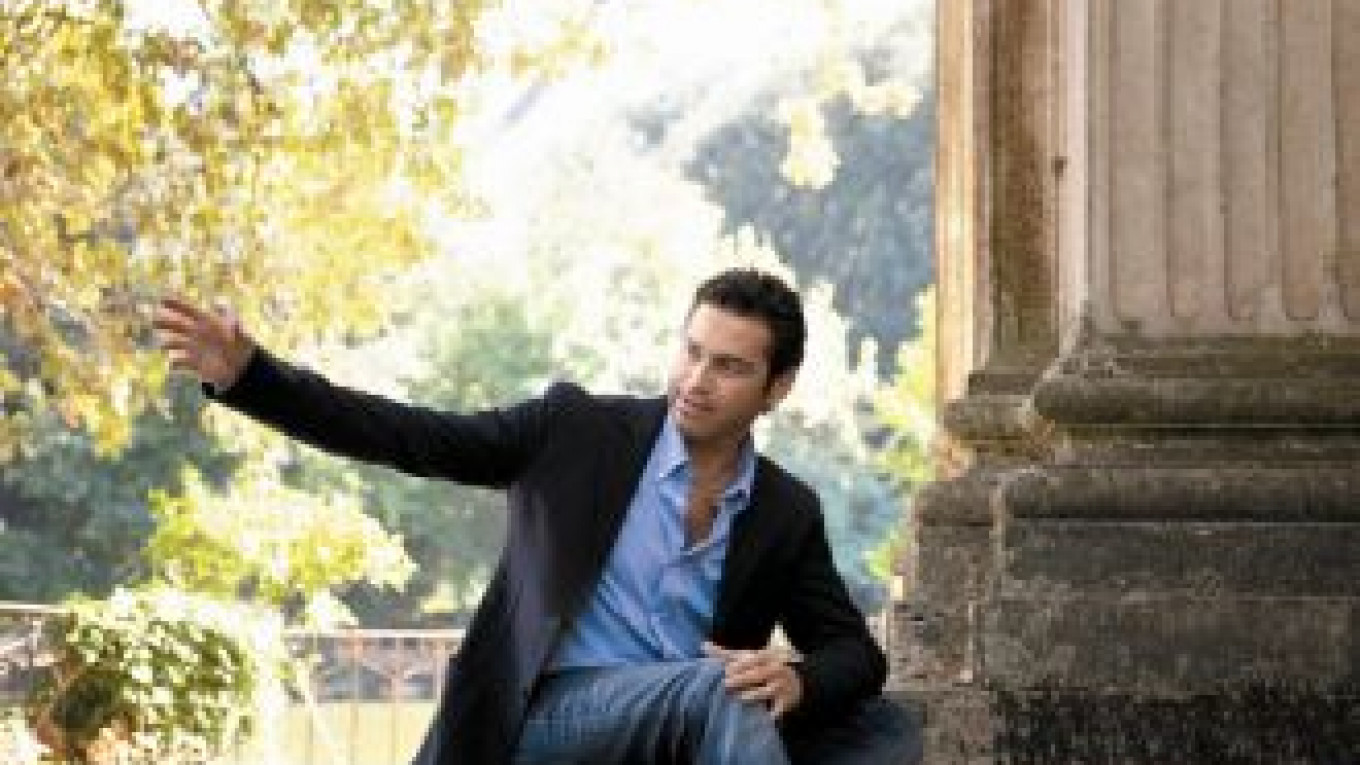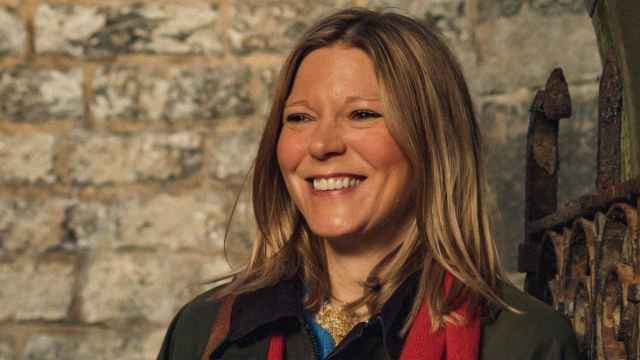Greek tenor Mario Frangoulis arrives in Moscow this week, psyched for his one-off performance at the State Kremlin Palace on June 14 alongside renowned Russian mezzo-soprano Maria Maksakova.
Born in war-torn Rhodesia — now Zimbabwe — he was taken to Greece at the age of four to live with his "new parents" (maternal relatives), going on to study at Athens Conservatoire. He later gained entry to London's Guildhall to study drama, after which he fulfilled a childhood dream by landing his first West-End role as Marius in Les Misérables.
The sudden move towards opera happened in 1989 after which he rocketed to international fame, releasing more than 12 albums to date. After his Kremlin concert, he plans to begin work on his first -broadly-termed- 'Christmas' album.
Frangoulis spoke with The Moscow Times via telephone from Montreal, Canada about his love for Russia's capital, the intensity of his childhood studies, reality shows and his tuxedo.
Q: How many times have you visited Moscow?
A: I've been to Moscow a few times. My first was with Maestro Kolobov years ago with the Novaya Opera. I did a concert dedicated to Maria Callas, a great opera singer. And another concert, that was actually to Verdi's music, singing arias from various operas, including la Traviata.
[On one of the occasions] I recorded an album with the Russian Balalaika Orchestra — it's like a full symphony orchestra, only with plucked strings. Coming to Moscow again brings back really good memories.
Q: What is your favorite aspect of the city?
A: The Bolshoi Opera. This year I have to go because one of my favorite operas is on — by Borodin — Prince Igor, so it will be great to revisit the Bolshoi. Of course, Moscow is one of the most beautiful cities in the world — great history and beautiful people.
Q: Which Russian composers and musicians do you most admire?
A: [Laughs] There're so many fantastic composers. I think Mussorgsky is one of my favorites, definitely — so is Boris Godunov, and, of course, Rimsky-Korsakov and Alexander Borodin. But I think Mussorgsky.
Q: What songs from your extensive repertoire can your audience expect to hear?
A: A few classical songs — I'm hoping for Maria to be able to sing some operetta and also some opera. We will probably perform a song or two from La Traviata. And some songs from my international recordings, from "Sometimes I Dream," "Beautiful Things," and "Follow Your Heart" — my latest album.
It's a very varied program: We spent a lot of time putting it together because it's not just the choice of songs but the story you tell through a program. Singing with Maria will be a great pleasure, and we had to combine our efforts in creating a new program for the Kremlin Symphony.
Q: Will you get the chance to explore?
A: I'm not sure. I'll be coming back from a very long trip — I'm now in Montreal, Canada. I'll have to go to Boston and Washington, then New York. I'm coming from New York to Moscow for rehearsals. I'll try and visit the opera — if I have time [laughs].
Q: Do you enjoy having the opportunity to travel so much?
A: It's great — you get to see friends that you haven't seen for a long time.
Q: How have you managed to acquire so many languages?
A: My first language, in the sense that I learned it, was English. Greek, of course, is my native language — I'm very proud of our heritage and our culture. Greek came naturally when I was living there. French, I learned along the way because I love the language; I had a French teacher at school who I liked very much.
Italian, I learned from opera. From the great writers, Puccini and Verdi and Bellini, the great songs of these masters.
Q: Is Russian on the extensive list of languages you speak?
A: I can't speak Russian, but I've sung in Russian: a couple of traditional songs. I love the sound of the Russian language and some of my favorite singers are Russian.
Q: Which do you believe is the most expressive, in terms of music?
A: I'm Greek so I'm biased! For me, I feel more emotional when I sing in Greek. But Italian I feel very passionate about, because it's the language we used when I was training as a classical singer. It has very pure vowels. Greek has the same pure vowels as Italian, but Italian sort of grows in the mouth, and is better when you're yearning to build up your singing technique.
The beauty of music is that it's the language of your heart and the soul, and that's the most important thing. People have said to me that even if they don't understand the language they feel close to me, so I'm very happy about that.
Q: How has your understanding of your childhood changed as you've grown up?
A: At the beginning I thought that I was deserted in another country, that I was taken away from my family — but I found safety in the hands of my new parents — it was my aunt's sister.
As young children we were affected. I have a brother who is a year and a half older than me, and my understanding of the separation was not quite clear at the time. Eventually, as the years went by, I understood that it was necessary. There was a lot of violence in Africa, the beginning of apartheid, and unfortunately my brother had to live through that instead of me.
But this became a lesson in my life — because it affected me so much. I felt that if I am able to help other children find a safe home during my career, I will do that.
Q: How did you develop an involvement with music?
A: My new family was amazing. They gave me a safe home. They introduced me to the great composers; they introduced me to music. We used to have concerts every Sunday morning.We would go to the palace theater in the center of Athens where we had big orchestras play.
I chose the king of all instruments: the violin. I went to the Athens Conservatoire to study music, to study composition, and I learned music from the inside out. That helped me enormously as a singer at a later stage. I was very lucky to be involved with music at such an early age, at the age of six .
I play the piano but not really so well. I compose my songs on the piano, but I'm too embarrassed to play publicly.
Q: Do you feel that you have to have a musical "gift," or do you believe more in hard work and application?
A: I don't think there is any secret; you have to be ready for the opportunity. If you are lucky, you will be given an opportunity at sometime in your life, and you have to be ready to take that challenge.
Work very hard on your craft, your technique, your studies, so that one day when you are given that chance, you are able to take it full on.
There was a time when I was in London doing so many things at the same time, all geared around the arts, and around singing, and acting. There was no spare moment for me. I was up at 7 in the morning and I was sleeping at 12 at night, waking up at 5 in the morning to be at drama school at 7. In between, whatever breaks I had, I would go to the library to study my Shakespeare … train my voice — I thought I was going to be an actor, and singing followed later.
I don't particularly agree with all the reality shows. Young people can get very lucky, and some of them are very talented. But I would urge them to go to school to learn to go the proper way. It's like when you do contemporary dance, for example, you study ballet to start with. And then if you want to go into contemporary dance, that's really up to you. But besides that, you need to do the groundwork.
Q: Do you get more free time nowadays?
A: More than when I was a student. I go out with my friends, swim in the summer and go surfing, go to the movies — I'm very normal. Sometimes people think you walk around in the tuxedo, and I don't [laughs].
Q: What are you most proud of?
I'm still looking for it. I'm working very hard. I started off very well from playing Marius in Les Misérables in the West End [London] — I auditioned for that part straight out of drama school.
To have my parents there, was great. I felt very proud that I came from Greece and went to London to audition and managed to get into a great drama school, and of course the first role was Marius. Part of my dream as a child — to be a romantic hero, who very much supports his ideals and what he believes in — was a great moment for me. Tony in West Side Story at La Scala many years later was a great moment too.
Mario Frangoulis plays June 14 at 7 p.m. At Kremlin Palace Moscow, located at 1 Ulitsa Vozdvizhenka. Metro Arbatskaya. Tel. 495-620-78-31. kremlinpalace.org.
Related articles:
A Message from The Moscow Times:
Dear readers,
We are facing unprecedented challenges. Russia's Prosecutor General's Office has designated The Moscow Times as an "undesirable" organization, criminalizing our work and putting our staff at risk of prosecution. This follows our earlier unjust labeling as a "foreign agent."
These actions are direct attempts to silence independent journalism in Russia. The authorities claim our work "discredits the decisions of the Russian leadership." We see things differently: we strive to provide accurate, unbiased reporting on Russia.
We, the journalists of The Moscow Times, refuse to be silenced. But to continue our work, we need your help.
Your support, no matter how small, makes a world of difference. If you can, please support us monthly starting from just $2. It's quick to set up, and every contribution makes a significant impact.
By supporting The Moscow Times, you're defending open, independent journalism in the face of repression. Thank you for standing with us.
Remind me later.






